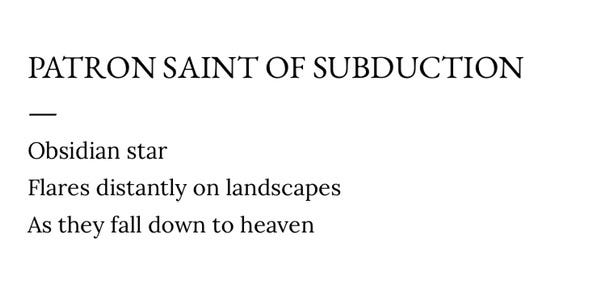typical forever?
and ☄️ catastrophic events!!!
I am writing to you from a different cafe this morning, the coffee is better but my outfit has been devastated by croissant crumbs.
I began to write something very boring about how the table-to-chair height ratio is very important on deciding where is a good cafe to write in, and then deleted it. Aren’t you glad you’ve been spared? It is true, though. Please weigh in on whether you like a low or high table.
This week I have been writing more poetry as part of National Poetry Month and I have once again fallen in love with the act of creating something every single day. I know I do not shut up about my 100 Tiny Songs but that project gave me the same feeling. When April is over I am very keen to continue this “once a day” habit but looking towards something more visual rather than word-y.
One of the things I need to do between now and the first single release for this album is create lots and lots of artwork, so, now, I am tentatively suggesting to myself that I create one visual thing a day, and share it for posterity. As always I am on Instagram doing lots of little silly things and will share it over there. And, heck, let’s do it on Twitter, too.
But let’s get into the meat of the newsletter! If this newsletter were a sandwich, this would be the bread. The handmade focaccia of irrelevant information to whet your appetite.
What I want to share with you is this: I have a title for my album, and it comes from a little scientific principle called Uniformitarianism.
I started writing full-length songs about geology a year ago, and shared them in my newsletter. If you are a new subscriber, here are a couple of those demos from the archives:
Over the last 12 months I have been slowly adding to my collection of geology songs, 12 in total (only 8 are making the album though!).
When it came to thinking of album titles, my boyfriend and I had a brainstorm, which I can’t say was overly successful:
He then came up with some suggestions:
Needless to say, none of those suggestions made the cut. Although ‘Bolder With U’ is good.
“Typical Forever,” which I mentioned in passing, was my favourite title so far. I held on to it thinking maybe I could replace it if I came up with something better. But the more I thought about it, the more fitting it felt. It was the perfect title for an album which combines geology and the experience of being a human.
Let me tell you where it comes from…
Charles Lyell, What A Guy
Charles Lyell is one of the “fathers” of geology, and he was Scottish, so obviously that means that Scottish people invented geology (we will take what we can get). He’s one of the first guys you get introduced to when you start learning about this stuff, because he presented and popularised one of most basic ideas that helps us understand the way the world was formed.
Lyell’s uniformitarianism principle, which sucks to type every time, basically put forward the idea that everything you see today about how the world works — the erosion, the oceans, the volcanoes and the slow steady behaviour of the world just worlding its way through existence — is how it’s always been.
Up until that point there was a period when catastrophism was popular way of explaining how our landscapes were shaped, which suggested that large catastrophic events and changes (boom!) curated our scenery, and explains gaps in the planet’s timeline.
Catastrophism, coincidentally, is my worldview when I haven’t eaten breakfast.
You can see how catastrophism would be accepted in the 19th century, when society was slowly and sometimes reluctantly trying to wean itself off of a Bible-centric worldview. Large scale events (and you can imagine people thinking of Noah’s Ark) that changed the way the world works still kept God relevant.
Giant floods of Biblical proportions did happen. Ice age floods, anyone? And of course, we all know now about mass extinction events. But these weren’t the only factors shaping our world today, and quite often not the most impactful ones. The world didn’t sit up one Tuesday and go, “you know what, I am going to radically change today!” and then just start a keto diet.
I think you can agree that humans don’t work like that either.
One of my favourite TikToks is this guy who is lying in bed, about to go to sleep, and then he sits up all of a sudden, and says something like this:
“I know! Tomorrow I am going to change my life! I’m going to start eating healthier, taking multivitamins, getting to sleep earlier and not eat past 6pm. I’m going to journal every day and call my friends more and every week I am going to go to at least one social event where there’s people I don’t know. I’m going to create a budget and stick to it, and then I’ll save up enough money to go to on holiday three times a year. I’ll have clear skin, I’ll delete all my social media apps and then use all that spare time to finally start writing my novel! This is perfect! My life is finally going to change!”
If you haven’t done this at least once in your life (or on a six-month periodic basis), I cannot relate to you.
The thing is, the way our lives unfold is much more like the steady trickle of a stream downhill. Or rain falling on a mountaintop. Or sediment settling slowly down to the bottom of the ocean. We move through periods of our lives gradually, and of course, there are catastrophic events, both good and bad: we get fired, we fall in love, we lose a parent, we land a dream job, we’re diagnosed with a chronic illness. In those moments large parts of our landscapes are changed, but the greatest influencer of who we are and how we live is the slow shift of everyday existence.
It’s one explanation of Lyell’s uniformity principle that really stuck with me, and it’s from a book called Hutton’s Arse by Malcom Rider. It goes as follows:
“what we see around us is typical forever and we can expect no difference from the past”
I really liked it because, yeah, life is typical forever.
I’ve talked about Typical Forever in terms of the planet, and also our own lives. But I want to finish with a thought about how humanity has its own uniformity principle. We’ve always been people, we’ve always been loving, lazy, greedy, kind, silly, wrathful… human.
I was thinking the other day about Onfim, a child who lived back in the 13th century in what is now Russia. These are his drawings:
He lived in the 1200’s. But his drawings look like something you’d see in a five year-old’s classroom today, if you walked in and looked at the wall.
Both the planet and the people: typical forever.
Wrapping up this week I’m gonna share a poem from this week’s offerings of poems. This one is (kinda) relevant because it is about subduction and also has theological themes? I don’t know if a three-line poem can have “themes”, but here we go:
As always you can find all my poems from this month on Instagram.
Well, that just about wraps it up! I had a great time writing this one, and I hope you enjoyed it too. If you want to forward it to a friend who you know will love it, maybe they’re also a geology nerd, or maybe they just love artsy writing about science, then please share.
Be good, be uniformly yourself, be typical, forever.
Olivia 🌋







![200: Horseman, with name "Onfim" to the rider's right, and above that the alphabet, A – K[8] 200: Horseman, with name "Onfim" to the rider's right, and above that the alphabet, A – K[8]](https://substackcdn.com/image/fetch/$s_!pbhA!,w_1456,c_limit,f_auto,q_auto:good,fl_lossy/https%3A%2F%2Fsubstack-post-media.s3.amazonaws.com%2Fpublic%2Fimages%2Fde4e6dcd-348c-4eb1-a213-ae8a0a44da4d_1414x934.gif)




High table - always a high table :)